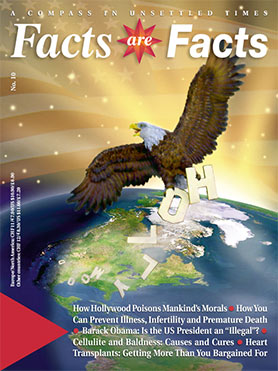Organ Transplants: "Two Souls alas! Are Dwelling in my Breast!"
The latest research shows: When a heart is transplanted, a part of the human soul comes along with the organ.
Ever since a donor heart beats in Ben’s breast, the 56-year-old college professor has been haunted by a gloomy, recurring dream—or is it a spiritual vision? “If you promise not to reveal my name, I will tell you something I haven’t even told my doctor,” says Ben conspiratorially. “A few weeks after I had received my new heart, the dreams came: I see a dazzling flash of light before my eyes and my face becomes very, very hot. It’s actually burning. But just before, I glimpse the face of Jesus.” When the widow of Ben’s heart donor heard these words, she turned as white as chalk…

Man is a cosmic being who dwells on different planes of existence.
In Germany alone almost 4,000 people receive organ transplants every year. Three times as many are waiting for donor organs. They estimate that 54,000 hearts have been transplanted worldwide thus far. Add to that the 470,000 kidneys, 74,000 livers, and 10,000 lungs that changed proprietors in the last century alone.
Allotransplantations—the transplantation of organs from person to person—have been routine in medicine for quite some time, but science has only started looking into the lives of patients after the operation for about fifteen years now. And they found that many recipients of hearts have the feeling that they are no longer themselves. Some patients even develop the fantasy that they are sharing a body.
The Austrian professor and psychologist Brigitte Bunzel knows of a woman who, along with her new heart, got the feeling that “there was someone else with me”. A feeling that lasted for several months: “In some impossible to clearly define way, my sense of ‘I’ developed into a kind of ‘we’. Sometimes I felt as if I was sharing my body with a second person.”
Is this all just delusion? The psychologist Oliver Decker believes, as do many other scientists, that these mysterious cases of ‘soul transfers’ with transplantations are nothing more than the product of an overactive imagination. “Organ recipients think a lot about the donor, and some even try to eat like the donor might have. And still others try to decorate their homes in the donor’s taste.”
So it’s not surprising that organ recipients who experience such changes to their personality rarely entrust this information to their doctors. Who likes to be laughed at or even finally end up in the crazy bin? Nevertheless, science is slowly beginning to take this phenomenon seriously. About six per cent of the heart transplant recipients that Brigitte Bunzel questioned reported such personality changes, which they themselves clearly account to the new heart. Other studies even come to the higher percentage of one-third. The number of unreported cases could, however, actually be much higher.
What’s Happening to Me?!
So are Debbie Vega’s appetite for fast food and her preference for rap just the results of a hysteric, exaggerated delusion? Hardly likely. For when these mysterious symptoms began, Debbie didn’t even know whose heart was beating in her chest. That has since changed. In the USA, patients can now find out who their organ donor was. And so Debbie paid a visit to the donor’s family, which totally shocked her. Howie Vareen, whose 18-year-old heart now beats in her chest, loved fast food more than anything. In the motorcycle jacket of the fatally wounded accident victim there was still a box filled with chicken nuggets. Debbie’s newly discovered appetite for beer probably also came from this young black man, just as her sudden interest in rap music.
We also cannot simply sweep the disturbing and recurring vision of Ben, the American college professor, under the rug as the result of some medication’s side effects, as his doctor did. Ben’s wife thanked the widow of Ben’s heart donor with the words: “I am so happy that you asked him about the transplant. He is much more unsettled than he admits. Meanwhile, he suffers from day-dreams: over and over, the face of Jesus and then this burst of light.”
The cause of these “Jesus visions” is of a very earthly and violent nature: Ben’s heart came from a 34-year old policeman who had been shot while trying to arrest a drug dealer. His widow knew immediately what Ben’s visions meant: “The dazzling flash of light in his face—that’s exactly how my husband died. The bastard shot him right in the face. The last thing he saw must have been a terrible flash. They never caught the murderer, but they think they know who it was. I saw a drawing of his face. He had long hair, big eyes, a beard, and radiated peace. You would immediately be reminded of images of Jesus.”
The US American cardiologist Dr. Paul Pearsall is especially intensely interested in personality changes after heart transplantations. He has interviewed more than one hundred heart recipients who believe that they are somehow connected with the deceased organ donor, verifying their statements by interviewing the recipient him/herself and his/her relatives as well as family members and friends of the organ donor, independently of each other.
There is the case, for example, of a 47-year-old man with the heart of a 14-year-old girl who suffered a gymnastics accident. The mother of the deceased teenager said of her daughter: “There was not one gram of fat on her. She had such joie de vivre that she jumped around like a kitten all the time. She did, however, have problems with food, often skipping meals. I think you could say that she was anorexic. She also had this silly giggle when she was embarrassed. It sounded like a little bird.”
The 47-year-old recipient had this to report: “I know it sounds stereotypical, but I really feel young again. I have this new nervous tendency to giggle all the time, which drives my wife nuts. And there’s something weird about food. I don’t know why. I’m hungry, but after I’ve eaten I often feel sick and would actually like to throw up.” And his brother adds: “Gus is a teenager, no doubt. He acts like a kid. Even when we’re bowling, he’ll scream and jump around like a crazy bird. And then there’s this weird laugh. He giggles like a girl, and we tell him, but it doesn’t matter to him. His healthy appetite hasn’t returned since the operation. Now he feels queasy most all the time.”
Memories of a Stranger’s Death
Ben, the college professor, is not the only case of a recipient who can remember the donor’s death. Five-year-old Daryl received the heart of a three-year-old boy who fell out of a window. When the parents of the unfortunate boy met with Daryl and his parents, his words brought them to tears. Daryl, who only knew that the heart of another boy was beating in his body, explained to his parents: “He is younger than me and I call him ‘Timmy’. He is like my little brother, about half as old as I am. He got hurt really badly when he fell down. Just like me, he really liked to play with the Power Rangers [Ed: little plastic figures].”
But Daryl hadn’t played with his Power Rangers since the operation for some unknown reason. The name of the poor boy was, by the way, Thomas, but everyone called him—Timmy. His mother explains with a shudder: “Timmy fell out of the window as he was trying to reach a Power Ranger that had fallen under the windowsill.”
Nine-year-old Jimmy developed an irrational fear of water after the heart of a three-year-old girl who had drowned in a private swimming pool had been grafted into him. Jimmy’s mother: “We live right by the lake. Jimmy used to love the water. But now he doesn’t even dare to go into the garden. He always closes the garden gate that leads to the shore and tells us that he’s deathly afraid of the water, even though he doesn’t know why.”
But as if that weren’t enough: Even though Jimmy doesn’t know where his new heart comes from, he seems to know the dead girl’s soul very well. “Sometimes I talk with her. I can feel her in here,” he explains to the researcher. “She seems to be really sad. I try to comfort her, but she’s really afraid. She says she wishes that parents wouldn’t just throw their kids away—I have no idea why she would say something like that.”
Jimmy’s parents know the answer by now because they visited the mother of the dead girl: She had gone through a very difficult divorce and the father never saw his daughter. The mother had to work a lot and was not really able to take care of her daughter, who was emotionally neglected.
Heart-rending scenes also played out when, four years after the tragic accident, the parents of a 16-month-old infant who had drowned met the family who had given their deceased son Jerry’s heart a new home for the first time. Carter, in whose chest Jerry’s heart now beats, was five years old at the time. Jerry’s mother remembers: “When Carter saw me for the first time, he ran to me and rubbed his nose on me again and again. That’s exactly what we used to do with Jerry. Jerry and Carter’s heart is now five years old, but Carter’s eyes were Jerry’s eyes. When he hugged me, I could feel my son. I mean, I could really feel him, not just metaphorically. He was there. I felt his energy.”
She continues, “I’m a doctor myself, trained in critical observation and, by nature, a sceptic. But this was real. I know that people will say I just needed to convince myself that my son’s spirit lived on, and that’s probably also true. But I felt it. My husband and my father felt it. And I swear to you that the same baby talk that our little Jerry used to babble tumbled out of Carter’s five-year-old mouth. ”
Jerry’s parents spent the night with Carter’s family. “In the middle of the night, Carter stood in our room and wanted to sleep with us,” Jerry’s mother continues. “He nestled between us, like Jerry used to, and we started to cry. Carter begged us to stop because Jerry told him that everything was ok.”
The ‘melding’ of Jerry and Carter was revealed by something else, too: Jerry had suffered from a slight lameness on the left side of his body. After the heart transplantation, the fit-as-a-fiddle Carter was suddenly troubled by recurring stiffness and uncontrollable jerks on the same side of his body.
The meeting with Jerry’s parents also shook Carter’s mother to the core. “I saw Carter run to Jerry’s mother. He’s never that way with strangers. He is very shy, but he ran to her like he used to run to me when he was a toddler. When I heard him whisper, ‘Everything’s ok, Mom,’ I fell apart. He called her ‘mother’, or maybe it was Jerry’s heart that was speaking.”






